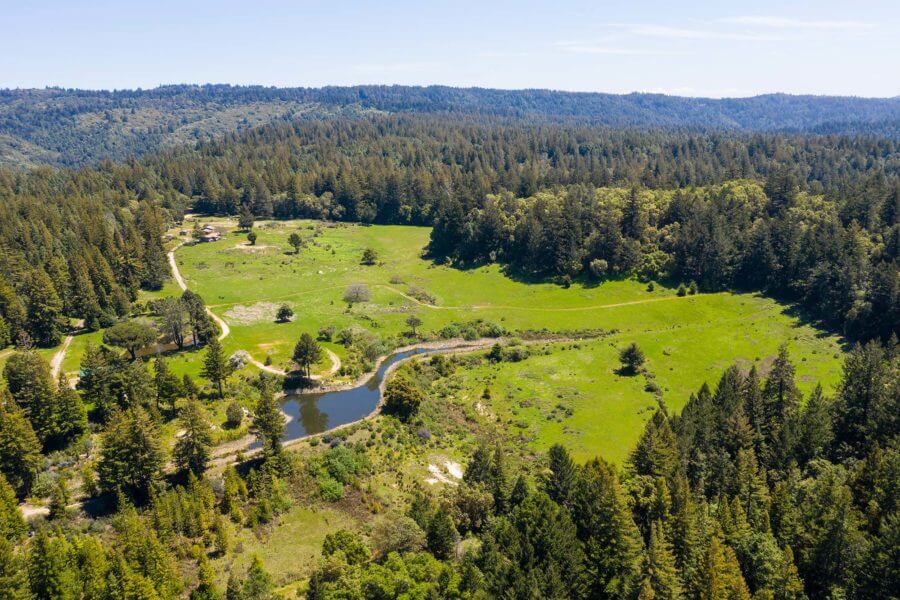Where Recreation Meets Restoration
The damaging human impacts over the past century have created a complex and large-scale conservation and restoration challenge. While some trees may be more than a thousand years old, clear-cut logging practices left groves of stunted trees growing too closely together and miles of old roads in need of repair. A lack of fallen trees diminishes habitat in the creeks and on the forest floor.
A visionary conservation plan addresses each area to protect old-growth redwoods, help overcrowded trees grow, enhance habitat in creeks and forest floors, remove an obsolete and obstructive dam, improve water quality in the creeks, reduce major wildfire risks, and monitor wildlife to help inform future stewardship projects and public access. San Vicente Redwoods’ trails were carefully planned to maximize recreation and minimize impacts to wildlife.
A World-Class Conservation Partnership
San Vicente Redwoods is a visionary conservation project. In 2011, four local land trusts—Sempervirens Fund, Peninsula Open Space Trust, Land Trust of Santa Cruz County, and Save the Redwoods League—came together to purchase the largest unprotected property in the region, saving it forever. It was the largest land purchase in Sempervirens Fund’s history. Together, we are hard at work restoring crucial habitat and healing the forests of tomorrow. Each organization has a unique role on the property, and each contributes significant resources and expertise. This partnership has been the key to making impactful improvements.
San Vicente’s forests are managed to optimize ecological health and habitat diversity. Our ongoing projects include forest and creek restoration, invasive weed management, bolstering fire resilience, and enhancing wildlife habitat.
Portions of the property are “restoration reserves” where strategic thinning occurs, allowing trees to better capture the resources they need to grow bigger, faster. This effort will increase viable habitat, store more carbon, and improve resiliency to fire and climate change. Removed trees can be placed in a creek to trap sediment and create critical habitat for wildlife, like endangered coho salmon. Revenue from the sale of any timber will be invested back into projects that benefit the long-term health of the San Vicente Redwoods.
Restoration forestry is good for the forest, good for land protection, and good for people. Examples of other projects include: removing invasive plants, road and culvert work to protect the watershed, and creating shaded fuel breaks to reduce the spread of catastrophic wildfires and improve safety for nearby communities.
A New Model for Public Access
With preservation of conservation values paramount, the San Vicente partners have also developed a cutting-edge public access plan, intended for welcoming the public into the property to explore and be inspired by the magnificent landscape. The plan pinpoints the optimal location of trails to minimize impacts on restoration projects and wildlife habitats. We look forward to sharing details of this plan with you.
Meanwhile, check out this Hilltromper video about the San Vicente Redwoods:
Connecting and Protecting
Connecting protected lands not only increases recreational opportunities, its crucial for plants and wildlife to have habitat with access to food, water, space and others of their species so they can survive and thrive. Sempervirens Fund has helped protect and connect 17,500 acres of land near San Vicente Redwoods. Here are some of the most recent lands that Sempervirens Fund supporters have protected for people and wildlife to enjoy forever.

Filice Ranch
At the headwaters of Scott Creek, Filice Ranch was an unprotected inholding in the San Vicente Redwoods that Sempervirens Fund and Peninsula Open Space partnered to preserve in 2019. Its 320 acres of redwoods, grasslands, wetlands, and chaparral--once the site of ranching, timber harvesting, movie filming, and potentially Prohibition-defying activities—are now being restored. Filice Ranch boasts stands of the threatened Anderson’s manzanita, prime habitat for mountain lions and possibly the endangered marbled murrelet, as well as ponds and structures that can help in managing the immense San Vicente Redwoods.
Cotoni-Coast Ridge
North of the town of Davenport on the coast of Santa Cruz County, Cotoni-Coast Ridge was one of two unprotected properties next to San Vicente Redwoods, which made the forests and habitat around it more vulnerable, until Sempervirens Fund supporters preserved the strategically important property in 2018. Its 106-acres are exceptional boasting breathtaking 360-degree views and ecological diversity with second-growth redwoods, coastal terrace prairie, coastal mixed hardwood, coastal scrub, and quickly disappearing native coastal grasslands. Perched above Scott Creek Beach, Cotoni-Coast Ridge falls within the nesting range of the endangered marbled murrelet and provides habitat for American badgers, white-tailed kites, great horned owls and northern harriers. Its headwaters for Quesaria Creek are essential to endangered Coho and steelhead salmon in lower Scott Creek. Cotoni-Coast Ridge connects a 17,500-acre protected landscape from San Vicente Redwoods to the Cotoni-Coast Dairies National Monument and Cal Poly’s Swanton Pacific Ranch. This connected wildland complex is crucial for species that need large habitats to survive like mountain lions and badgers.
Get a glimpse into how our Land Team is restoring these remote and rare habitats—watch Saving the Last Great Grasslands.